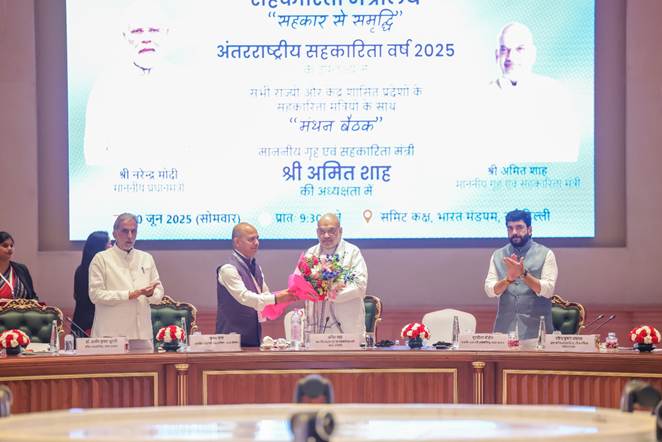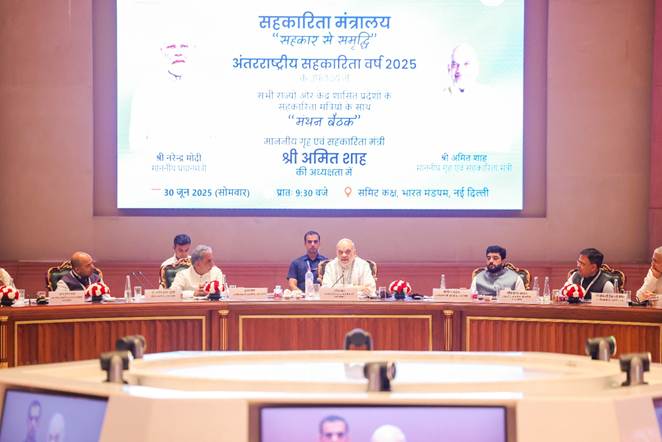
New Delhi, June 30- Union Home Minister and Minister of Cooperation, Amit Shah, chaired a landmark “Manthan Baithak” with Cooperation Ministers from all States and Union Territories in New Delhi on Monday. Held as part of the build-up to the International Year of Cooperatives 2025, the meeting aimed to evaluate ongoing initiatives, foster collaboration, and push forward reforms in India’s cooperative sector.
The gathering, organized by the Ministry of Cooperation, witnessed the enthusiastic participation of Cooperation Ministers, Secretaries, and senior officials from across the country. The platform provided a crucial opportunity for states to exchange ideas, assess implementation of key schemes, and align efforts with the central government’s vision of ‘Sahkar Se Samriddhi‘—Prosperity through Cooperation.

In his address, Amit Shah underlined that Prime Minister Narendra Modi‘s government created the Ministry of Cooperation to revive and reform India’s cooperative legacy with a forward-looking approach. He emphasized that cooperatives can be powerful vehicles for inclusive growth, job creation, and rural entrepreneurship—especially for citizens who now aspire to improve their economic status after gaining access to basic amenities over the last decade.
Highlighting the need for every village in India to have at least one cooperative society, Shah urged states to fully utilize the National Cooperative Database to identify gaps and strategically plan cooperative expansion. He announced the government’s target of ensuring a cooperative presence in every village within the next five years. Shah also reflected on the reasons that historically weakened the cooperative movement—outdated laws, limited scope of activities, and nepotistic recruitment. Addressing these challenges, he said that the Modi government has introduced structural changes, expanded operational domains, and emphasized transparent hiring.
He also called on every state to affiliate at least one cooperative training institute with the Tribhuvan Sahkari University and manage state-wide cooperative training through this framework. The university is envisioned as the cornerstone for modern and disciplined cooperative education.
A major announcement during the Baithak was the upcoming launch of the National Cooperative Policy 2025–2045, which will guide states to develop their own localized cooperative policies based on regional conditions and aspirations. States are expected to finalize their policies by January 31, 2026.
The meeting reviewed progress on computerization of Primary Agricultural Credit Societies (PACS) and the Registrar of Cooperative Societies (RCS) offices. Delegates discussed the implementation of the world’s largest grain storage scheme in the cooperative sector and the ongoing drive to establish 2 lakh Multi-Purpose PACS nationwide, with the 2025–26 targets to be met by February 2026.
Emphasis was also placed on strengthening Urban Cooperative Banks and Credit Societies, ensuring transparency in their operations and recruitment processes. Shah noted that bringing cooperative banks under the Banking Act has enhanced regulation, and further progress depends on merit-based governance.

Amit Shah urged states to promote natural farming in collaboration with their Agriculture Departments. He stressed that sustainable agricultural practices benefit both public health and the environment.
The session also included discussions on supporting three key national multi-state cooperative societies:
National Cooperative Export Limited (NCEL)
National Cooperative Organic Limited (NCOL)
Bharatiya Beej Sahkari Samiti Limited (BBSSL)
Delegates also explored the White Revolution 2.0 aimed at building a circular and sustainable dairy economy and supporting procurement of pulses and maize under Atmanirbhar Bharat.
The “Manthan Baithak” reaffirmed the Centre and States’ commitment to transforming India’s cooperative ecosystem into a robust pillar of grassroots-led economic development. As the world prepares to observe the International Year of Cooperatives in 2025, India is setting an ambitious path toward a cooperative-driven future rooted in federal collaboration, innovation, and inclusive progress.


















No Comments: